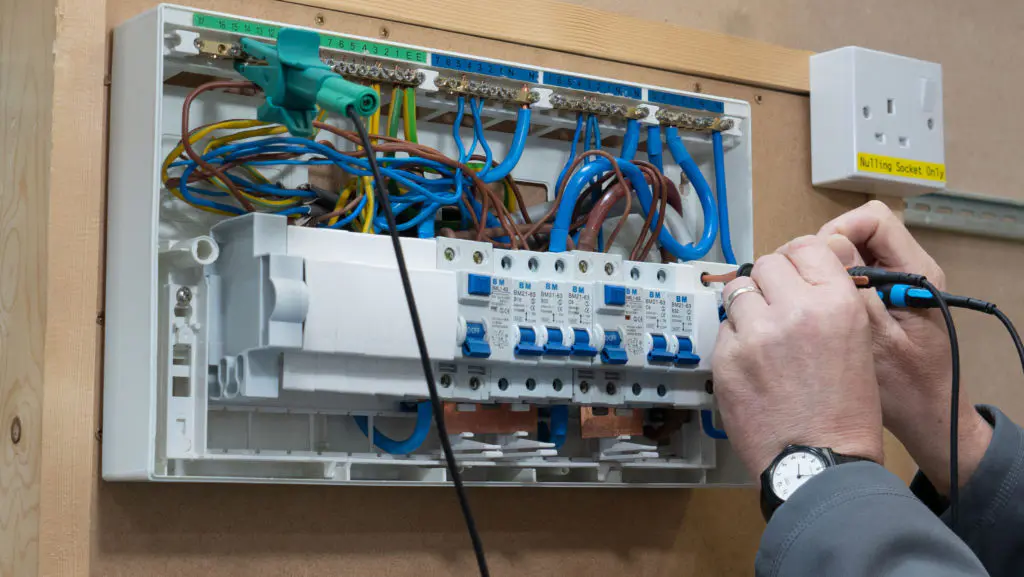Wondering what the EICR rules entail for landlords in the UK? Ensuring compliance with these regulations is not just a legal obligation but a crucial aspect of tenant safety and property maintenance.

From understanding the inspection process to handling remedial work, the EICR rules set a standard that landlords must adhere to. But what are the specific requirements and implications for landlords when it comes to EICR?
Let’s explore the essential guidelines that every landlord should be well-versed in to maintain a secure and compliant rental property.
Understanding EICR for Landlords
In understanding EICR for landlords, it’s essential to grasp the detailed requirements and implications of this crucial electrical safety regulation in England. Maintenance tips play a vital role in ensuring the safety of electrical installations.
Landlord responsibilities include conducting regular EICR inspections to guarantee tenant safety. Safety measures should be prioritized to prevent hazards and comply with regulations. Compliance guidelines dictate that EICR reports must be categorized as satisfactory or unsatisfactory, with necessary remedial work promptly addressed.
The inspection process involves a thorough assessment by qualified professionals to evaluate the property’s electrical system. It’s crucial for landlords to adhere to these guidelines to maintain safe electrical installations.
Legal Requirements and Implications
Exploring the legal obligations and ramifications surrounding EICR compliance delves into the essential framework of electrical safety regulations for landlords in England. Compliance consequences are significant, with potential fines for landlords reaching up to £30,000.
Ensuring safety standards are met is cruc al, as non-compliance can lead to severe penalties, including the loss of property insurance coverage. Validity of inspections is key, with reports categorized as satisfactory or unsatisfactory, requiring remedial actions promptly to address any identified hazards.
Landlords must understand the importance of adhering to inspection validity timelines to avoid legal implications. Remedial actions, such as necessary repairs or upgrades, should be conducted by qualified professionals within 28 days of receiving the report. It’s imperative to communicate effectively with tenants and local authorities throughout the remedial process.
Exemptions and Landlord’s Duty of Care
Upon considering exemptions and the duty of care for landlords concerning EICR compliance, it’s crucial to understand the specific scenarios where regulations may not apply.
- Tenant Safety: Even in exempt scenarios, ensuring the safety of tenants should remain a top priority for landlords.
- Landlord Obligations: Despite exemptions, landlords are still responsible for maintaining a safe living environment for tenants.
- Exemption Criteria: Criteria for exemptions should be thoroughly reviewed to determine applicability to specific properties.
- Duty of Care: Landlords have a legal and moral duty to provide a safe place for tenants to live, regardless of exemptions.
- Compliance Requirements: Understanding the full scope of compliance requirements is essential to avoid potential legal consequences.
It’s important for landlords to navigate the exemptions carefully, always keeping in mind the ultimate goal of ensuring tenant safety and fulfilling their duty of care.
The EICR Inspection Process

Conducting an EICR involves a comprehensive assessment of a property’s electrical installations to ensure compliance with safety standards outlined in BS 7671. This detailed inspection is carried out by qualified electricians, evaluating various components like wiring, sockets, and consumer units.
The inspection report includes thorough details regarding the assessment and the condition of the installations, crucial for maintaining safe electrical systems in the property. In cases where observations necessitate remedial actions, landlords must promptly address these issues. It’s imperative for landlords to hire qualified professionals to handle any required remedial work and confirm compliance with safety standards.
Additionally, communication with tenants regarding the inspection results and any necessary remedial actions is essential to ensure transparency and uphold tenant safety standards. Keeping tenants informed and involved in the process is key to maintaining a safe living environment and complying with EICR regulations.
Handling Remedial Work Post-Inspection
When addressing remedial work post-inspection, landlords are responsible for promptly engaging qualified professionals to rectify any identified issues in the electrical installations. Ensuring safety compliance and timely remediation are paramount in maintaining a secure environment for tenants and meeting legal obligations.
Here are key points to consider:
- Safety Compliance: Prioritize safety standards outlined in the inspection report.
- Work Completion: Ensure all identified issues are promptly addressed and rectified.
- Professional Handling: Engage qualified electricians to conduct the necessary remedial work.
- Documentation Proof: Provide written confirmation of work completion adhering to safety standards.
- Timely Remediation: Complete all required remedial work within 28 days or sooner for urgent matters.
EICR Rules Importance for Landlords
Ensuring compliance with EICR rules is a critical responsibility for landlords in England to prioritize tenant safety and maintain legal requirements. Tenant safety is paramount, and adhering to EICR regulations is crucial in creating a secure living environment. Compliance benefits extend beyond legal obligations, as regular electrical maintenance safeguards against hazards, ensuring a safe environment for tenants.
Failure to comply can result in severe legal implications, including penalties and enforcement actions. Landlords must understand their responsibilities, which include conducting EICR inspections every five years by qualified professionals and providing tenants with inspection reports promptly.
Frequently Asked Questions
Can Landlords Conduct the EICR Inspection Themselves or Does It Have to Be Done by a Qualified Electrician?
I wouldn’t conduct a DIY inspection as a landlord. It’s crucial for safety and legal compliance to have qualified electricians handle EICR. Their expertise ensures professional assessment, peace of mind, and mitigates risks associated with inaccurate or incomplete inspections.
Are There Any Specific Requirements for the Format or Layout of the EICR Report That Landlords Need to Follow?
In crafting the EICR report, landlords should ensure a clear format adhering to safety standards. My inspection as a landlord must maintain professionalism by requiring qualified professionals for remedial work upon receiving an unsatisfactory report.
How Can Landlords Ensure That the Remedial Work Carried Out Post-Inspection Meets the Necessary Safety Standards?
To ensure the remedial work post-inspection meets safety standards, I oversee quality control to verify compliance with regulations. I maintain a detailed checklist for assessment, focusing on preventing electrical hazards and upholding maintenance standards to guarantee safety.
Are There Any Specific Qualifications or Certifications That Landlords Should Look for When Hiring a Professional to Conduct the EICR Inspection?
When hiring for EICR inspections, ensure professionals hold relevant qualifications like NICEIC or ELECSA certification. Verify expertise in electrical safety regulations and thorough inspection processes. Following professional recommendations guarantees compliant and safe assessments.
What Steps Should Landlords Take if They Receive an Unsatisfactory EICR Report for Their Property?
Upon receiving an unsatisfactory EICR report, I swiftly devise a response plan ensuring safety standards compliance. Effective communication strategy and legal obligations guide my actions. Professional input, documentation review, tenant notification, and maintenance schedule are crucial for follow-up.
Conclusion
In conclusion, as a landlord in the UK, ensuring compliance with EICR rules is essential for maintaining the safety and well-being of tenants.
By understanding legal requirements, conducting timely inspections, and addressing any necessary remedial work promptly, landlords can create a secure living environment and foster trust with their tenants.
Prioritizing EICR compliance not only meets regulatory obligations but also demonstrates a commitment to providing a safe and reliable rental property.









